IMPORT & EXPORT PROCEDURES/GUIDELINES – BEING A PAPER

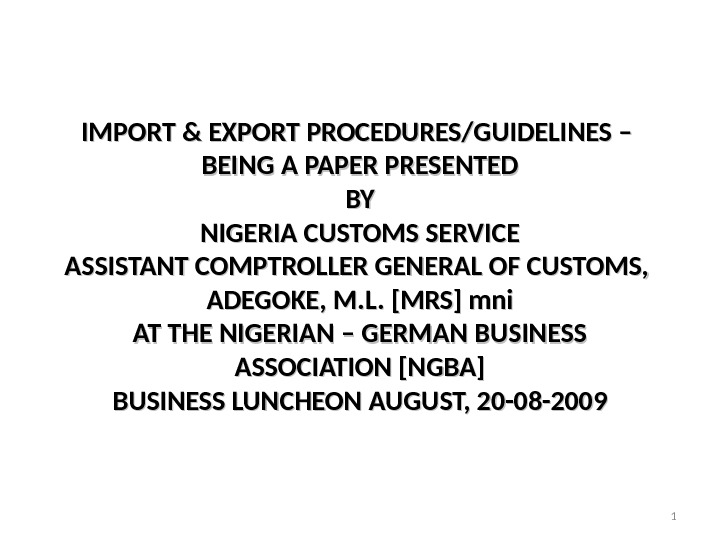
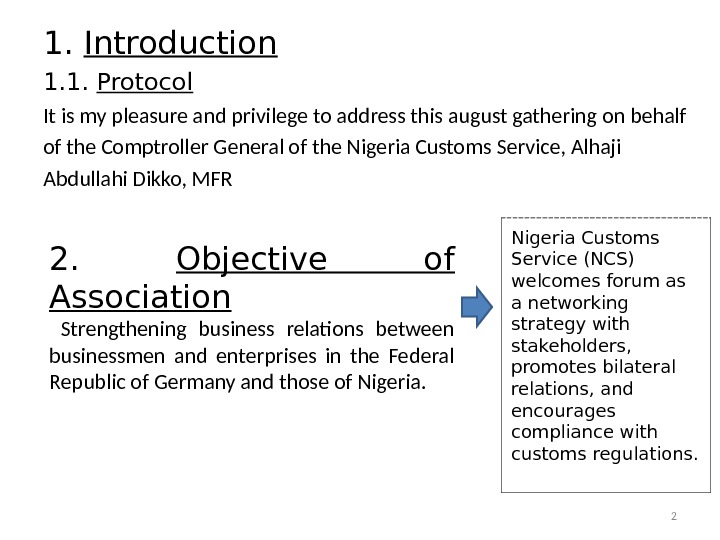

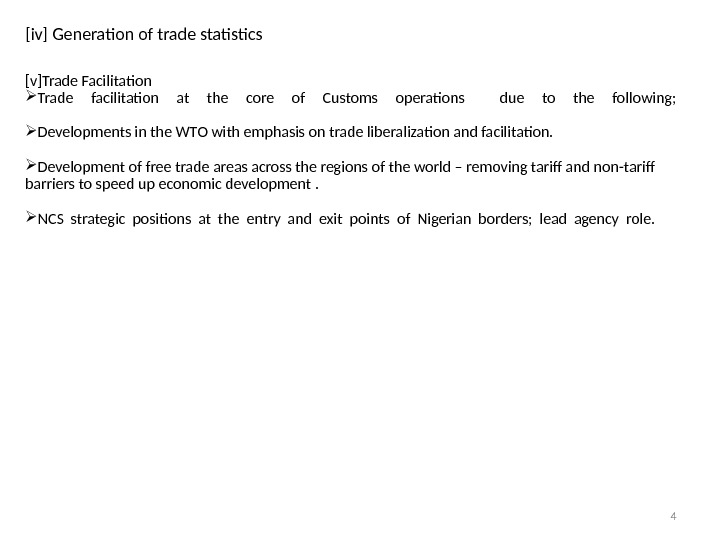
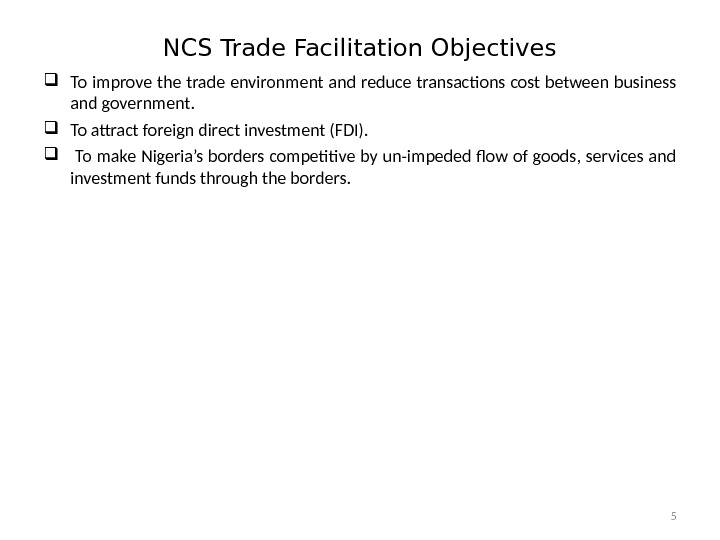
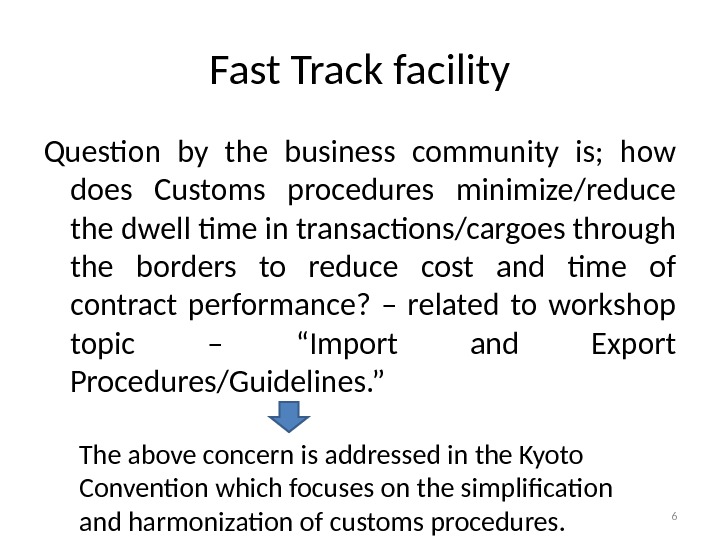
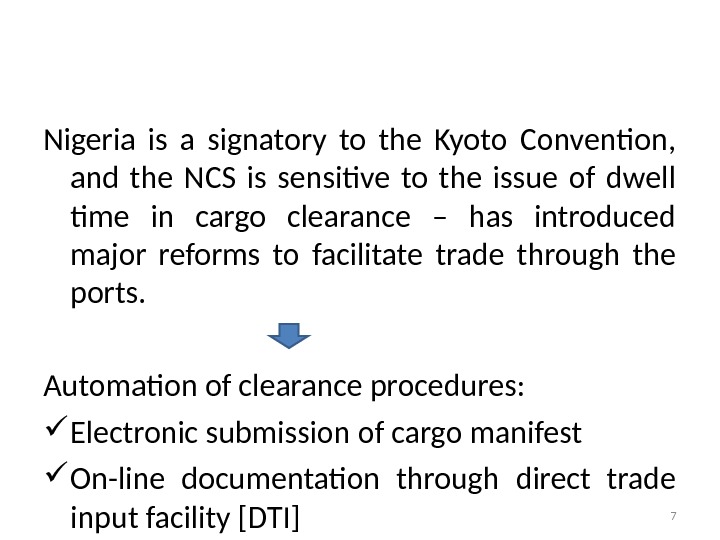

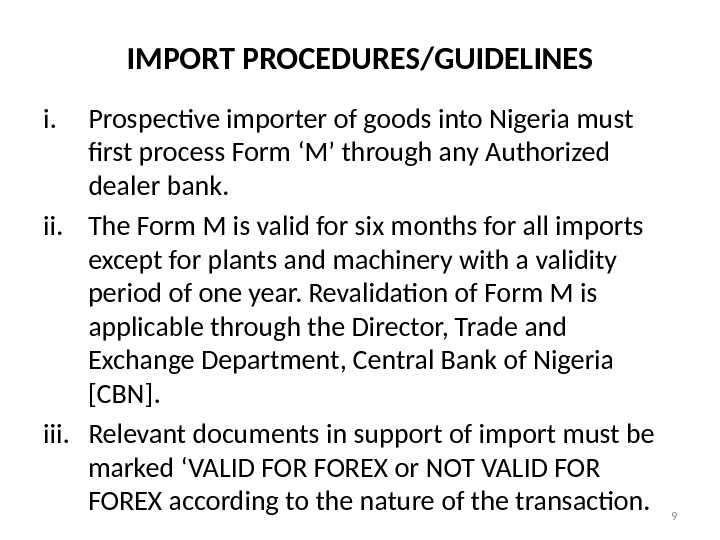
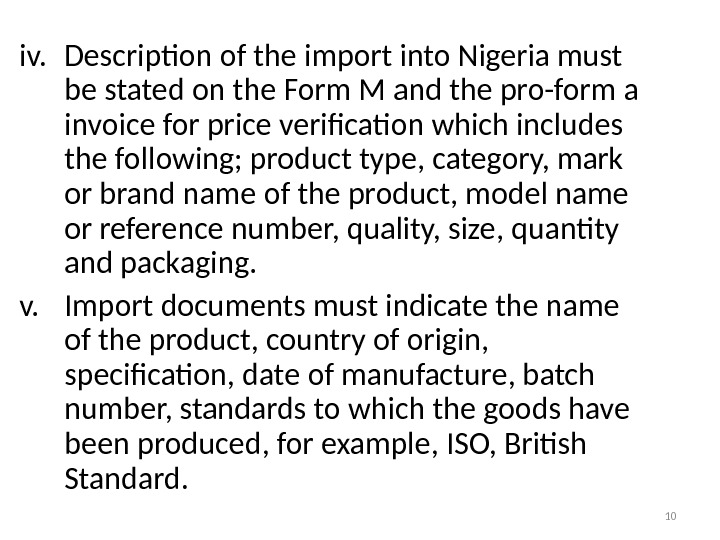
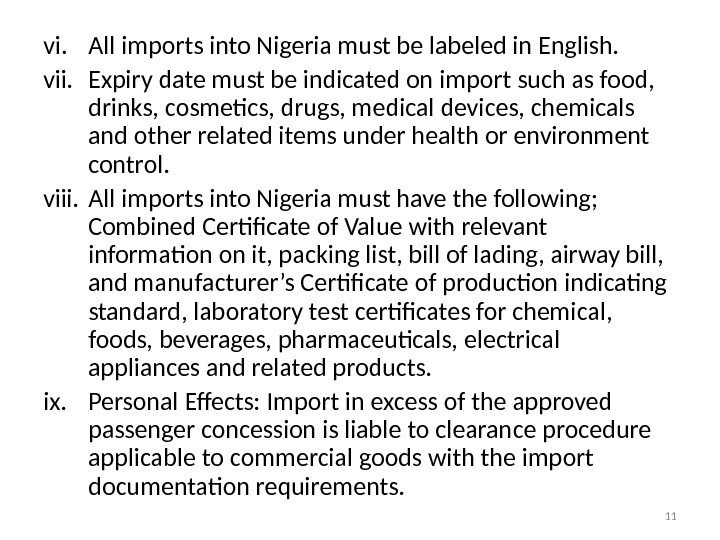
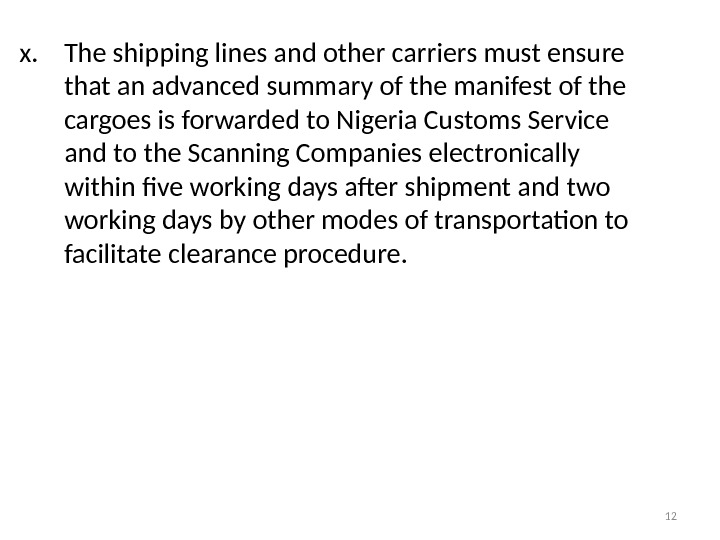
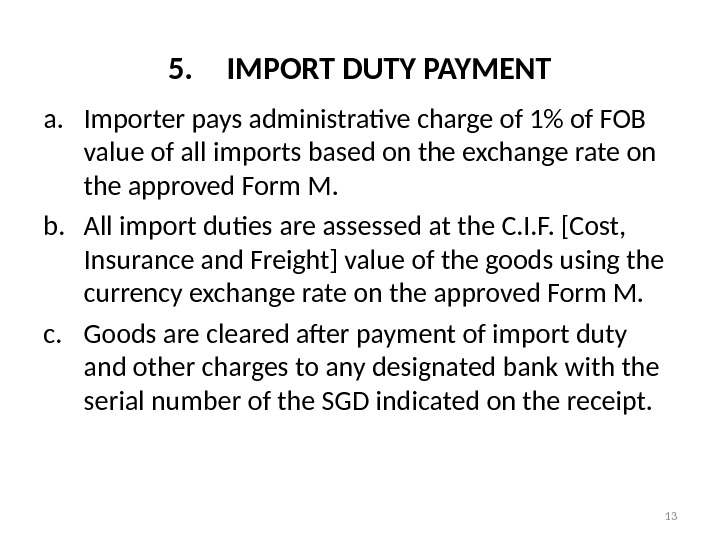
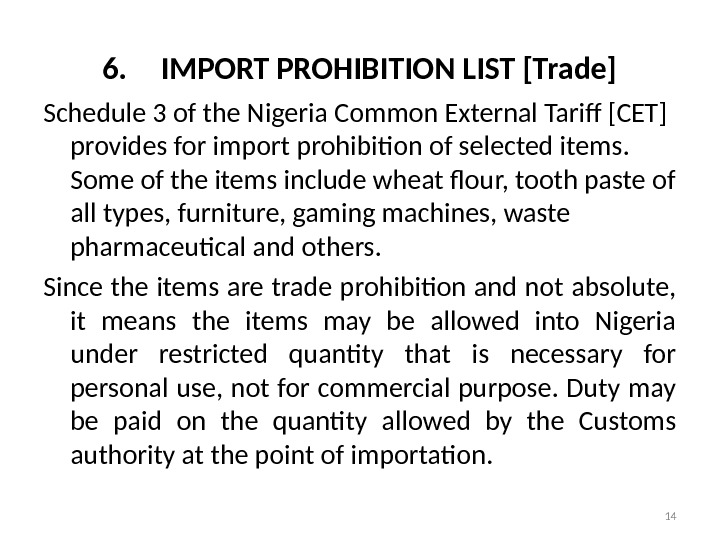
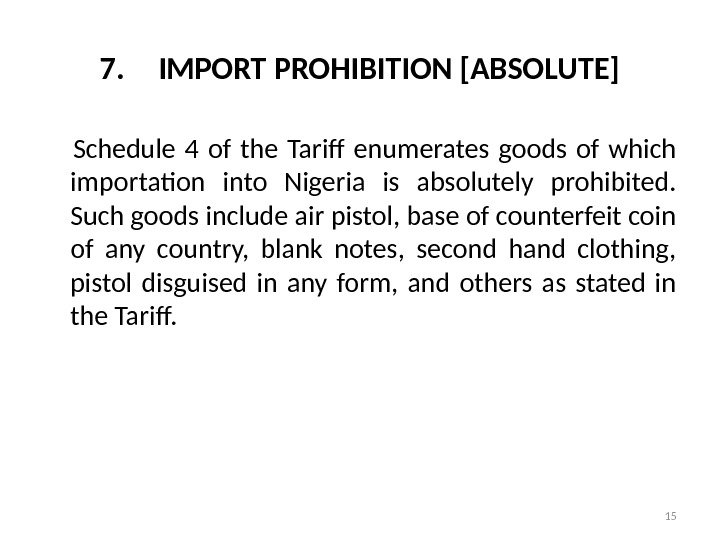

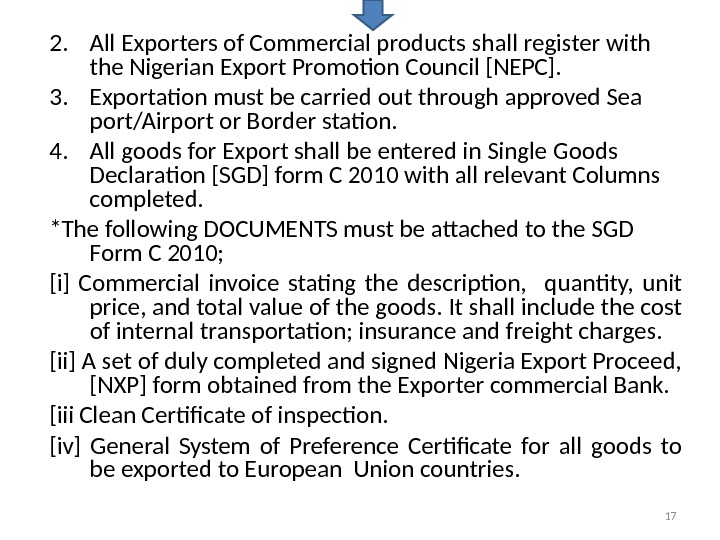
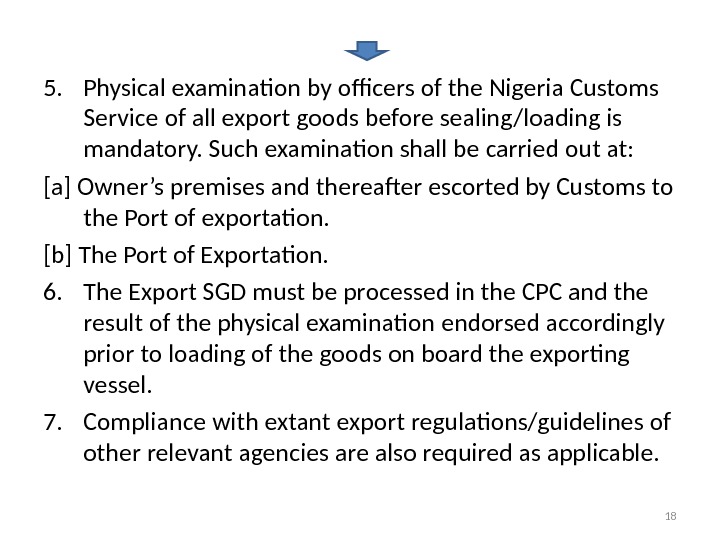
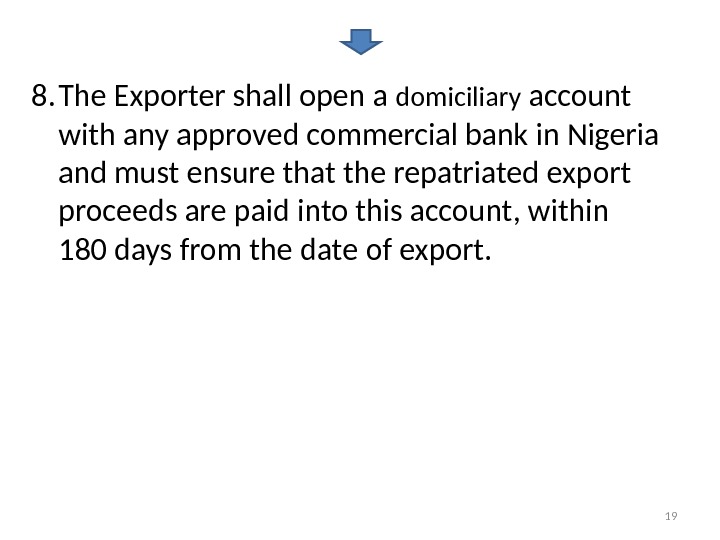


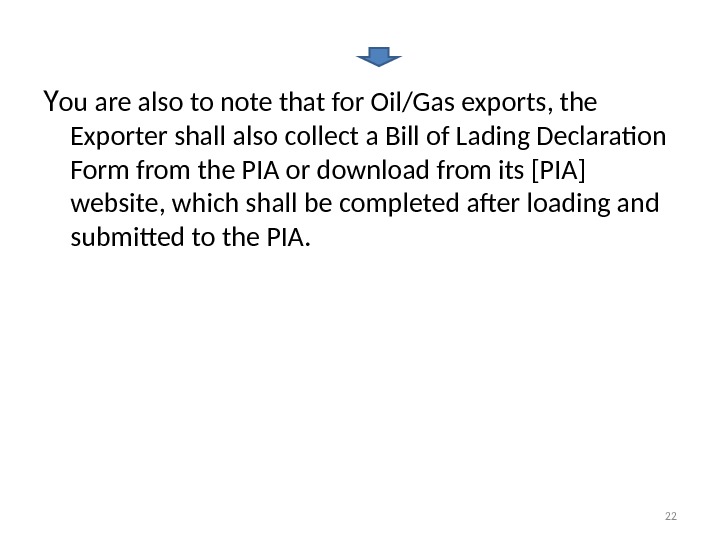

import_and_export_procedures_and_guidelines.ppt
- Размер: 282.5 Кб
- Количество слайдов: 23
Описание презентации IMPORT & EXPORT PROCEDURES/GUIDELINES – BEING A PAPER по слайдам
 IMPORT & EXPORT PROCEDURES/GUIDELINES – BEING A PAPER PRESENTED BY BY NIGERIA CUSTOMS SERVICE ASSISTANT COMPTROLLER GENERAL OF CUSTOMS, ADEGOKE, M. L. [MRS] mni AT THE NIGERIAN – GERMAN BUSINESS ASSOCIATION [NGBA] BUSINESS LUNCHEON AUGUST, 20 -08 —
IMPORT & EXPORT PROCEDURES/GUIDELINES – BEING A PAPER PRESENTED BY BY NIGERIA CUSTOMS SERVICE ASSISTANT COMPTROLLER GENERAL OF CUSTOMS, ADEGOKE, M. L. [MRS] mni AT THE NIGERIAN – GERMAN BUSINESS ASSOCIATION [NGBA] BUSINESS LUNCHEON AUGUST, 20 -08 —
 1. Introduction 1. 1. Protocol It is my pleasure and privilege to address this august gathering on behalf of the Comptroller General of the Nigeria Customs Service, Alhaji Abdullahi Dikko, MFR Nigeria Customs Service (NCS) welcomes forum as a networking strategy with stakeholders, promotes bilateral relations, and encourages compliance with customs regulations. 2. Objective of Association Strengthening business relations between businessmen and enterprises in the Federal Republic of Germany and those of Nigeria.
1. Introduction 1. 1. Protocol It is my pleasure and privilege to address this august gathering on behalf of the Comptroller General of the Nigeria Customs Service, Alhaji Abdullahi Dikko, MFR Nigeria Customs Service (NCS) welcomes forum as a networking strategy with stakeholders, promotes bilateral relations, and encourages compliance with customs regulations. 2. Objective of Association Strengthening business relations between businessmen and enterprises in the Federal Republic of Germany and those of Nigeria.
 NIGERIA CUSTOMS SERVICE & NATIONAL ECONOMY Functions of NCS in the Nigerian Economy: i. Revenue Collection Customs & Excise Management Act, Cap 84 Laws of the Federation [CEMA, Section 4], LFN. 1990 – power to control and manage administration of the Customs & Excise Laws. Collects and account for revenue. [ii] Anti – smuggling operations Applicable at: Borders, sea and airports – checks contrabands, hazardous goods, national security interest. Physical interception, examination of goods and documents. [iii] Agency function [inter-agency] NCS performs inter-agency functions on behalf of other government agencies, namely; • Nigeria Police Force – seizure of arms and ammunitions. • National Agency for Food and Drug Administration and Control [NAFDAC] – prevents illegal importation of foods, drugs and chemicals. • National Drug Law Enforcement Agency [NDLEA] – prevents importation and exportation of hard drugs.
NIGERIA CUSTOMS SERVICE & NATIONAL ECONOMY Functions of NCS in the Nigerian Economy: i. Revenue Collection Customs & Excise Management Act, Cap 84 Laws of the Federation [CEMA, Section 4], LFN. 1990 – power to control and manage administration of the Customs & Excise Laws. Collects and account for revenue. [ii] Anti – smuggling operations Applicable at: Borders, sea and airports – checks contrabands, hazardous goods, national security interest. Physical interception, examination of goods and documents. [iii] Agency function [inter-agency] NCS performs inter-agency functions on behalf of other government agencies, namely; • Nigeria Police Force – seizure of arms and ammunitions. • National Agency for Food and Drug Administration and Control [NAFDAC] – prevents illegal importation of foods, drugs and chemicals. • National Drug Law Enforcement Agency [NDLEA] – prevents importation and exportation of hard drugs.
![[iv] Generation of trade statistics [v]Trade Facilitation Trade facilitation at the core of Customs operations [iv] Generation of trade statistics [v]Trade Facilitation Trade facilitation at the core of Customs operations](/docs//import_and_export_procedures_and_guidelines_images/import_and_export_procedures_and_guidelines_3.jpg) [iv] Generation of trade statistics [v]Trade Facilitation Trade facilitation at the core of Customs operations due to the following; Developments in the WTO with emphasis on trade liberalization and facilitation. Development of free trade areas across the regions of the world – removing tariff and non-tariff barriers to speed up economic development. NCS strategic positions at the entry and exit points of Nigerian borders; lead agency role.
[iv] Generation of trade statistics [v]Trade Facilitation Trade facilitation at the core of Customs operations due to the following; Developments in the WTO with emphasis on trade liberalization and facilitation. Development of free trade areas across the regions of the world – removing tariff and non-tariff barriers to speed up economic development. NCS strategic positions at the entry and exit points of Nigerian borders; lead agency role.
 NCS Trade Facilitation Objectives To improve the trade environment and reduce transactions cost between business and government. To attract foreign direct investment (FDI). To make Nigeria’s borders competitive by un-impeded flow of goods, services and investment funds through the borders.
NCS Trade Facilitation Objectives To improve the trade environment and reduce transactions cost between business and government. To attract foreign direct investment (FDI). To make Nigeria’s borders competitive by un-impeded flow of goods, services and investment funds through the borders.
 Fast Track facility Question by the business community is; how does Customs procedures minimize/reduce the dwell time in transactions/cargoes through the borders to reduce cost and time of contract performance? – related to workshop topic – “Import and Export Procedures/Guidelines. ” The above concern is addressed in the Kyoto Convention which focuses on the simplification and harmonization of customs procedures.
Fast Track facility Question by the business community is; how does Customs procedures minimize/reduce the dwell time in transactions/cargoes through the borders to reduce cost and time of contract performance? – related to workshop topic – “Import and Export Procedures/Guidelines. ” The above concern is addressed in the Kyoto Convention which focuses on the simplification and harmonization of customs procedures.
 Nigeria is a signatory to the Kyoto Convention, and the NCS is sensitive to the issue of dwell time in cargo clearance – has introduced major reforms to facilitate trade through the ports. Automation of clearance procedures: Electronic submission of cargo manifest On-line documentation through direct trade input facility [DTI]
Nigeria is a signatory to the Kyoto Convention, and the NCS is sensitive to the issue of dwell time in cargo clearance – has introduced major reforms to facilitate trade through the ports. Automation of clearance procedures: Electronic submission of cargo manifest On-line documentation through direct trade input facility [DTI]
 E-payment of duty Use of scanners for profiling and cargo examination. Also refer to publication on Customs website; www. customs. gov. ng for customs regulations and procedures.
E-payment of duty Use of scanners for profiling and cargo examination. Also refer to publication on Customs website; www. customs. gov. ng for customs regulations and procedures.
 IMPORT PROCEDURES/GUIDELINES i. Prospective importer of goods into Nigeria must first process Form ‘M’ through any Authorized dealer bank. ii. The Form M is valid for six months for all imports except for plants and machinery with a validity period of one year. Revalidation of Form M is applicable through the Director, Trade and Exchange Department, Central Bank of Nigeria [CBN]. iii. Relevant documents in support of import must be marked ‘VALID FOREX or NOT VALID FOREX according to the nature of the transaction.
IMPORT PROCEDURES/GUIDELINES i. Prospective importer of goods into Nigeria must first process Form ‘M’ through any Authorized dealer bank. ii. The Form M is valid for six months for all imports except for plants and machinery with a validity period of one year. Revalidation of Form M is applicable through the Director, Trade and Exchange Department, Central Bank of Nigeria [CBN]. iii. Relevant documents in support of import must be marked ‘VALID FOREX or NOT VALID FOREX according to the nature of the transaction.
 iv. Description of the import into Nigeria must be stated on the Form M and the pro-form a invoice for price verification which includes the following; product type, category, mark or brand name of the product, model name or reference number, quality, size, quantity and packaging. v. Import documents must indicate the name of the product, country of origin, specification, date of manufacture, batch number, standards to which the goods have been produced, for example, ISO, British Standard.
iv. Description of the import into Nigeria must be stated on the Form M and the pro-form a invoice for price verification which includes the following; product type, category, mark or brand name of the product, model name or reference number, quality, size, quantity and packaging. v. Import documents must indicate the name of the product, country of origin, specification, date of manufacture, batch number, standards to which the goods have been produced, for example, ISO, British Standard.
 vi. All imports into Nigeria must be labeled in English. vii. Expiry date must be indicated on import such as food, drinks, cosmetics, drugs, medical devices, chemicals and other related items under health or environment control. viii. All imports into Nigeria must have the following; Combined Certificate of Value with relevant information on it, packing list, bill of lading, airway bill, and manufacturer’s Certificate of production indicating standard, laboratory test certificates for chemical, foods, beverages, pharmaceuticals, electrical appliances and related products. ix. Personal Effects: Import in excess of the approved passenger concession is liable to clearance procedure applicable to commercial goods with the import documentation requirements.
vi. All imports into Nigeria must be labeled in English. vii. Expiry date must be indicated on import such as food, drinks, cosmetics, drugs, medical devices, chemicals and other related items under health or environment control. viii. All imports into Nigeria must have the following; Combined Certificate of Value with relevant information on it, packing list, bill of lading, airway bill, and manufacturer’s Certificate of production indicating standard, laboratory test certificates for chemical, foods, beverages, pharmaceuticals, electrical appliances and related products. ix. Personal Effects: Import in excess of the approved passenger concession is liable to clearance procedure applicable to commercial goods with the import documentation requirements.
 x. The shipping lines and other carriers must ensure that an advanced summary of the manifest of the cargoes is forwarded to Nigeria Customs Service and to the Scanning Companies electronically within five working days after shipment and two working days by other modes of transportation to facilitate clearance procedure.
x. The shipping lines and other carriers must ensure that an advanced summary of the manifest of the cargoes is forwarded to Nigeria Customs Service and to the Scanning Companies electronically within five working days after shipment and two working days by other modes of transportation to facilitate clearance procedure.
 5. IMPORT DUTY PAYMENT a. Importer pays administrative charge of 1% of FOB value of all imports based on the exchange rate on the approved Form M. b. All import duties are assessed at the C. I. F. [Cost, Insurance and Freight] value of the goods using the currency exchange rate on the approved Form M. c. Goods are cleared after payment of import duty and other charges to any designated bank with the serial number of the SGD indicated on the receipt.
5. IMPORT DUTY PAYMENT a. Importer pays administrative charge of 1% of FOB value of all imports based on the exchange rate on the approved Form M. b. All import duties are assessed at the C. I. F. [Cost, Insurance and Freight] value of the goods using the currency exchange rate on the approved Form M. c. Goods are cleared after payment of import duty and other charges to any designated bank with the serial number of the SGD indicated on the receipt.
![6. IMPORT PROHIBITION LIST [Trade] Schedule 3 of the Nigeria Common External Tariff [CET] provides for 6. IMPORT PROHIBITION LIST [Trade] Schedule 3 of the Nigeria Common External Tariff [CET] provides for](/docs//import_and_export_procedures_and_guidelines_images/import_and_export_procedures_and_guidelines_13.jpg) 6. IMPORT PROHIBITION LIST [Trade] Schedule 3 of the Nigeria Common External Tariff [CET] provides for import prohibition of selected items. Some of the items include wheat flour, tooth paste of all types, furniture, gaming machines, waste pharmaceutical and others. Since the items are trade prohibition and not absolute, it means the items may be allowed into Nigeria under restricted quantity that is necessary for personal use, not for commercial purpose. Duty may be paid on the quantity allowed by the Customs authority at the point of importation.
6. IMPORT PROHIBITION LIST [Trade] Schedule 3 of the Nigeria Common External Tariff [CET] provides for import prohibition of selected items. Some of the items include wheat flour, tooth paste of all types, furniture, gaming machines, waste pharmaceutical and others. Since the items are trade prohibition and not absolute, it means the items may be allowed into Nigeria under restricted quantity that is necessary for personal use, not for commercial purpose. Duty may be paid on the quantity allowed by the Customs authority at the point of importation.
![7. IMPORT PROHIBITION [ABSOLUTE] Schedule 4 of the Tariff enumerates goods of which importation into 7. IMPORT PROHIBITION [ABSOLUTE] Schedule 4 of the Tariff enumerates goods of which importation into](/docs//import_and_export_procedures_and_guidelines_images/import_and_export_procedures_and_guidelines_14.jpg) 7. IMPORT PROHIBITION [ABSOLUTE] Schedule 4 of the Tariff enumerates goods of which importation into Nigeria is absolutely prohibited. Such goods include air pistol, base of counterfeit coin of any country, blank notes, second hand clothing, pistol disguised in any form, and others as stated in the Tariff.
7. IMPORT PROHIBITION [ABSOLUTE] Schedule 4 of the Tariff enumerates goods of which importation into Nigeria is absolutely prohibited. Such goods include air pistol, base of counterfeit coin of any country, blank notes, second hand clothing, pistol disguised in any form, and others as stated in the Tariff.
 8. EXPORT PROCEDURE/GUIDELINES The following procedure is to be observed by officers and all relevant agencies who are involved in the documentation process of clearing of goods for Export from Nigeria: 1. All oil/non-oil export from Nigeria except the following: personal effect, used motor vehicles and perishables, that is, day old chicks, human remains, vaccines, yeast, periodicals/magazines, shall be subjected to inspection by the pre-shipment Inspection Agents [PIA] appointed for the purpose by the Federal Government of Nigeria and the necessary Clean Certificate of Inspection [CCI] issued before shipment. Messrs Cobalt International Services Ltd. is the Pre-shipment Inspection Agent for Nigeria.
8. EXPORT PROCEDURE/GUIDELINES The following procedure is to be observed by officers and all relevant agencies who are involved in the documentation process of clearing of goods for Export from Nigeria: 1. All oil/non-oil export from Nigeria except the following: personal effect, used motor vehicles and perishables, that is, day old chicks, human remains, vaccines, yeast, periodicals/magazines, shall be subjected to inspection by the pre-shipment Inspection Agents [PIA] appointed for the purpose by the Federal Government of Nigeria and the necessary Clean Certificate of Inspection [CCI] issued before shipment. Messrs Cobalt International Services Ltd. is the Pre-shipment Inspection Agent for Nigeria.
![2. All Exporters of Commercial products shall register with the Nigerian Export Promotion Council [NEPC]. 3. 2. All Exporters of Commercial products shall register with the Nigerian Export Promotion Council [NEPC]. 3.](/docs//import_and_export_procedures_and_guidelines_images/import_and_export_procedures_and_guidelines_16.jpg) 2. All Exporters of Commercial products shall register with the Nigerian Export Promotion Council [NEPC]. 3. Exportation must be carried out through approved Sea port/Airport or Border station. 4. All goods for Export shall be entered in Single Goods Declaration [SGD] form C 2010 with all relevant Columns completed. *The following DOCUMENTS must be attached to the SGD Form C 2010; [i] Commercial invoice stating the description, quantity, unit price, and total value of the goods. It shall include the cost of internal transportation; insurance and freight charges. [ii] A set of duly completed and signed Nigeria Export Proceed, [NXP] form obtained from the Exporter commercial Bank. [iii Clean Certificate of inspection. [iv] General System of Preference Certificate for all goods to be exported to European Union countries.
2. All Exporters of Commercial products shall register with the Nigerian Export Promotion Council [NEPC]. 3. Exportation must be carried out through approved Sea port/Airport or Border station. 4. All goods for Export shall be entered in Single Goods Declaration [SGD] form C 2010 with all relevant Columns completed. *The following DOCUMENTS must be attached to the SGD Form C 2010; [i] Commercial invoice stating the description, quantity, unit price, and total value of the goods. It shall include the cost of internal transportation; insurance and freight charges. [ii] A set of duly completed and signed Nigeria Export Proceed, [NXP] form obtained from the Exporter commercial Bank. [iii Clean Certificate of inspection. [iv] General System of Preference Certificate for all goods to be exported to European Union countries.
 5. Physical examination by officers of the Nigeria Customs Service of all export goods before sealing/loading is mandatory. Such examination shall be carried out at: [a] Owner’s premises and thereafter escorted by Customs to the Port of exportation. [b] The Port of Exportation. 6. The Export SGD must be processed in the CPC and the result of the physical examination endorsed accordingly prior to loading of the goods on board the exporting vessel. 7. Compliance with extant export regulations/guidelines of other relevant agencies are also required as applicable.
5. Physical examination by officers of the Nigeria Customs Service of all export goods before sealing/loading is mandatory. Such examination shall be carried out at: [a] Owner’s premises and thereafter escorted by Customs to the Port of exportation. [b] The Port of Exportation. 6. The Export SGD must be processed in the CPC and the result of the physical examination endorsed accordingly prior to loading of the goods on board the exporting vessel. 7. Compliance with extant export regulations/guidelines of other relevant agencies are also required as applicable.
 8. The Exporter shall open a domiciliary account with any approved commercial bank in Nigeria and must ensure that the repatriated export proceeds are paid into this account, within 180 days from the date of export.
8. The Exporter shall open a domiciliary account with any approved commercial bank in Nigeria and must ensure that the repatriated export proceeds are paid into this account, within 180 days from the date of export.
 8. OIL AND GAS EXPORT There shall be a final joint inspection by the Inspection Agent, Nigeria Customs Service, the Department of Weights and Measures of the Federal Ministry of Commerce and Industry and the Department of Petroleum Resources. The units of measurement with respect to quality and quantity determination in the Oil/Gas industry is unique and should be appropriately reflected in the NXP form. Having carried out the inspection, the Inspection agent shall complete its respective section of the NXP form and then send the third copy to the Nigeria Customs Service.
8. OIL AND GAS EXPORT There shall be a final joint inspection by the Inspection Agent, Nigeria Customs Service, the Department of Weights and Measures of the Federal Ministry of Commerce and Industry and the Department of Petroleum Resources. The units of measurement with respect to quality and quantity determination in the Oil/Gas industry is unique and should be appropriately reflected in the NXP form. Having carried out the inspection, the Inspection agent shall complete its respective section of the NXP form and then send the third copy to the Nigeria Customs Service.
 The Inspection agent shall ensure the quality, quantity and value of the goods to be exported and if satisfied issue a Clean Certificate of Inspection. No loading of any export cargo into Sea going vessels or aircraft shall be authorized without the issuance of the CCI. In Oil/Gas, the fiscalisation/defiscalisation team shall include representatives of the Terminal Operator, Pre-shipment Inspection Agent [PIA], Nigeria Customs Service, Weight and Measures Department of the Federal Ministry of Commerce and Industry, Department of Petroleum Resources [DPR] and independent Cargo surveyors appointed by the buyer.
The Inspection agent shall ensure the quality, quantity and value of the goods to be exported and if satisfied issue a Clean Certificate of Inspection. No loading of any export cargo into Sea going vessels or aircraft shall be authorized without the issuance of the CCI. In Oil/Gas, the fiscalisation/defiscalisation team shall include representatives of the Terminal Operator, Pre-shipment Inspection Agent [PIA], Nigeria Customs Service, Weight and Measures Department of the Federal Ministry of Commerce and Industry, Department of Petroleum Resources [DPR] and independent Cargo surveyors appointed by the buyer.
 Y ou are also to note that for Oil/Gas exports, the Exporter shall also collect a Bill of Lading Declaration Form from the PIA or download from its [PIA] website, which shall be completed after loading and submitted to the PIA.
Y ou are also to note that for Oil/Gas exports, the Exporter shall also collect a Bill of Lading Declaration Form from the PIA or download from its [PIA] website, which shall be completed after loading and submitted to the PIA.
 THANK YOU FOR LISTENING
THANK YOU FOR LISTENING

